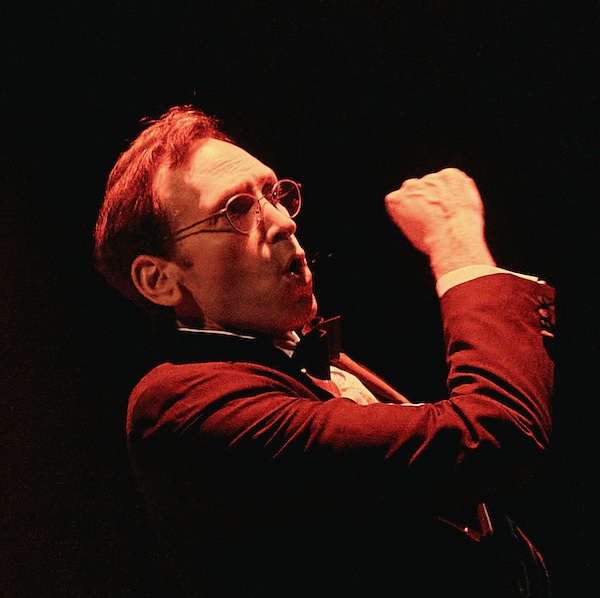
By the end of “Kyoto,” a play about the effort it took to achieve the first international agreement to address the climate crisis, we come to understand — perhaps too well – that it was a long, painstaking and frustrating process. The Kyoto Protocol, which 84 nations initially signed in Kyoto, Japan in 1997, came after nearly a decade in which great world powers and tiny island nations alike argued endlessly with one another over priorities and punctuation.
“This is all about language, Don. Punctuation. Down to the last comma,” an atmospheric physicist tells Don Pearlman at a “plenary session” in Sweden in 1990, when Pearlman, portrayed by Stephen Kunkin, is just starting to get involved. Don is the narrator of “Kyoto,” and its central character, which is a sly move, because he is also the villain.

A Washington lawyer who had served as chief of staff to the Energy Secretary during the Reagan administration, he was hired by the “Seven Sisters” – which was the nickname for the companies that dominated the petroleum industry – to prevent any global action on global warming, especially any commitment to the setting of “targets and timetables for the reduction of greenhouse gas emissions.” Pearlman was the oil companies’ secret weapon. Kunken is ours. Matter-of-fact in an appealing way, sometimes witty, he can be almost persuasive at first when he argues that the science is not clear, or that the economic consequences would be severe, or that it’s hypocritical to benefit from the comforts of modern civilization without acknowledging what it took to get them. But by the time even his wife thinks he’s wrong, Kunken lets us see that what drives his continuing opposition has little to do with reason. Meanwhile, he also serves as our guide through the intricate politics and diplomacy.
The quartet of theater artists who put together “Kyoto” – writers Joe Murphy and Joe Robertson, directors Stephen Daldry and Justin Martin — also worked together on The Jungle, an extraordinary immersive re-creation of a real-life refugee camp; Daldry and Martin also co-directed “Stranger Things: The First Shadow” No, there are no levitating people or disappearing ships, not even melting ice caps, and “Kyoto” is nowhere near as immersive as “The Jungle.’ But . there is a touch of audience immersion: We are all given a delegate or media badges to wear around our necks, and several theatergoers are enlisted to sit around the conference table as if important delegates. And the overall staging and the ensemble acting do turn this history lesson into an often engaging work of theater.
There is more than just humor in the haggling over a proposed sentence: “Climate change will cause negative impacts,” which China suggests be changed to: Climate Change will cause negative and positive impacts.” USA suggests: “Climate change will cause negative and positive impacts, but the negative ones will dominate” Saudi Arabia (secretly advised by Don) suggests that since there is no consensus, the sentence be eliminated from the report entirely.
The play comes most alive when the action finally arrives in Kyoto. One of the most memorable scenes is a hilariously surreal one in which the delegates become a collapsing tower of babble. But this is also where the characters, who are mostly recognized just by the country they represent (Kate Burton is a brisk USA) emerge as individuals, and all the arguing and angling becomes recognizable diplomacy. There is even a hero in this story: Jorge Bosch as a Raul Estrada-Oyuela, who started out as the Argentinian ambassador to China (assigned to climate change because “I was the only diplomat available. Everyone else was mysteriously on vacation.”) He becomes the chairman and the canny savior of the accord.
Indeed, it occurred to me that the play might have worked just as well (if not better) without Act I, which dramatizes conferences in England, Sweden, Geneva, Nairobi and Rio. But perhaps the authors felt that history is not just the most dramatic moments, but what it took to get to them
And in truth, among the moments I might most remember about “Kyoto” is the information that the oil companies were told way back in 1959 that the burning of fossil fuels at the then-current rate would create “gobal warming, the melting of the ice caps, sea level rise and the flooding of low-lying coastal regions all over the world.” And they buried the information, and the plans to prevent it, as long as they could.
Kyoto
Lincoln Ccnter’s Mitzi Newhouse Theater through November 30
Running time: 2 hours 40 minutes, including one intermission
Tickets: $140 – $212
Written by Joe Murphy and Joe Robertson
Directed by Stephen Daldry and Justin Martin
Set design by Miriam Buether, costume design by Natalie Pryce, lighting design by Aideen Malone, sound design by Christopher Reid, video design by Akhila Krishnan, original music by Paul English, dramaturg Gemma Stockwood
Cast: Stephen Kunken sd Don Pearlman,’ Jorge Bosch as Raul Estrada-Oyuela,’ Peter Bradbury as climate change skeptic ‘Fred Singer,’ Kate Burton as ‘USA,’ Feodor Chin as ‘China,’ Erin Darke as ‘Germany,’ Natalie Gold as ‘Shirley,’ Daniel Jenkins as ‘Gore/Bolin/Santer/Observer,’ Dariush Kashani as ‘Saudi Arabia,’ Rob Narita as ‘Japan,’ Imani Jade Powers as ‘Secretariat,’ Ferdy Roberts U.K./Prescott/Houghton,’ Roslyn Ruff as ‘Tanzania,’ and Taiana Tully as ‘Kiribati.’ Offstage understudies include Odera Adimorah, Clark Carmichael, Luis Carlos de La Lombana, Paul Juhn, Amelia McClain, and Lianah Sta. Ana.
Like this:
Like Loading…
Related


AloJapan.com